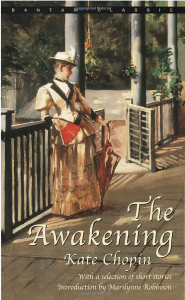Armand Aubigny
Source Text: Chopin, Kate. The Awakening: With a Selection of Short Stories. 1899. Reprint. New York City: Bantam Dell, 1981. 177-182. Print.
Entry Author: Emma Baker
In Kate Chopin’s short story, “Desiree’s Baby,” Armand Aubigny is the father of the titular child and the husband of Desiree. Belonging to a well-known, respectable Creole family, he owns a plantation called L’Abri that he inherited from his father. He spent his childhood in Paris until his mother’s death, and returned home to the United States with his father. Presumably, he lived with his mother when she was still alive. His role in the short story focuses on falling in love with Desiree, the adopted daughter of the Valmondés, another well-known creole family. Although Desiree comes from an ‘obscure origin,’ as the Valmondés found her around the ‘toddling age’ near the gateway to their home, Armand initially finds that no obstacle to marriage instead asserting, “What did it matter about a name when he could give her one of the oldest and proudest in Louisiana?” However, while his father treated the slaves under his ownership with kindness, “Young Aubigny’s rule was a strict one, too, and under it his negroes had forgotten how to be gay.” (Chopin, 177)
As such, Chopin positions Armand Aubigny as the character with the most power in his societal context. He is male, wealthy, and at the start of the story, both the reader and the surrounding characters believe he is white. One can see evidence of his exercise of this power in the treatment of his slaves as well as evidence of prejudice and racism. He seems reasonable in his acceptance of a nameless wife whose origins are unknown at the start of the novel, but after the birth of their child one perceives changes in his behavior. Others notice the child’s skin tone before he does but he begins to absent “himself from home; and when there, avoided [Desiree’s] presence and that of her child, without excuse.” (Chopin, 179) After Desiree herself realizes the similarity to one of the quadroon boys of La Blanche, a mulatto slave, she pleads with Armand to tell her what it means. He only responds, “it means…that the child is not white; it means that you are not white.” (Chopin, 180) Armand is not suspected to be the reason for the child’s quadroon appearance, as Desiree’s origin is unknown. As she attempts to defend herself by naming her features, he cruelly responds, “As white as La Blanche,” (Chopin, 180) demonstrating that the physical appearance of whiteness holds no power when one carries ‘black blood.’ Following this, he draws further away from his wife, begins to treat his slaves with a greater cruelty than before and does not prevent his wife from walking unprotected into the bayou with her child never to return. His position in a place of power demonstrates how influential his actions and decisions are on the lives of others around him, as well as highlight the discrepancy between an unknown origin or namelessness and the possibility of having black ancestry.
Chopin does not reveal his parentage until the last lines of the story. As he burns all of Desiree’s belongings he finds a letter sent from his mother to his father saying, “I thank the good God for having so arranged our lives that our dear Armand will never know that his mother, who adores him, belongs to the race that is cursed with the brand of slavery.” (Chopin, 182) The reader then retroactively remembers various mentions throughout the story of “Armand’s dark, handsome face,” (Chopin, 179) and when Desiree pleads, “look at my hand; whiter than yours, Armand.” (Chopin, 180) As such, Chopin constructs Armand as a mixed race character who passes for white and maintains, if not enforces, the status quo in order to demonstrate the hypocrisy of the Louisiana culture. In the revelation of his mixed race as the final and pivotal plot-point, Chopin upsets the status quo by suggesting a complete lack of adherence throughout the piece, as well as emphasizing the dire consequences that resulted from adherence to those conventions.

